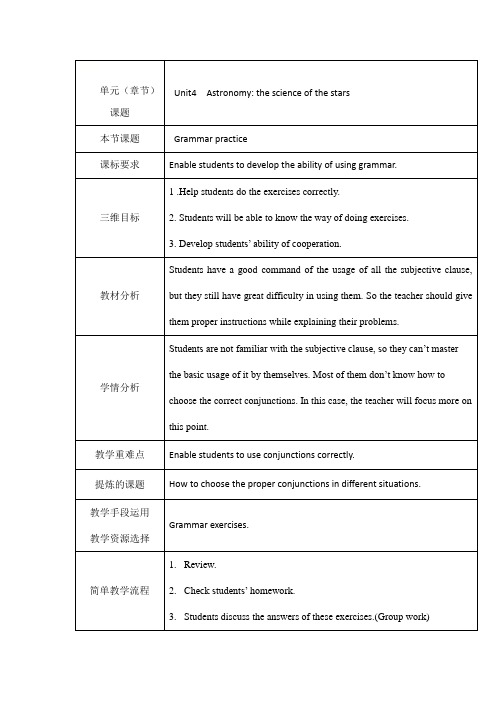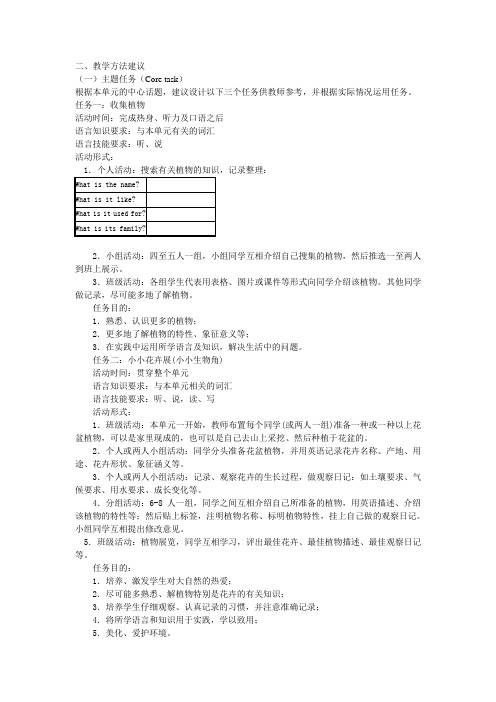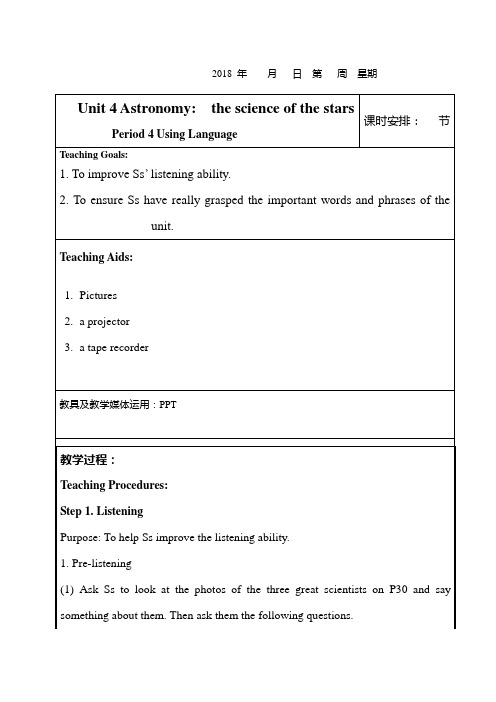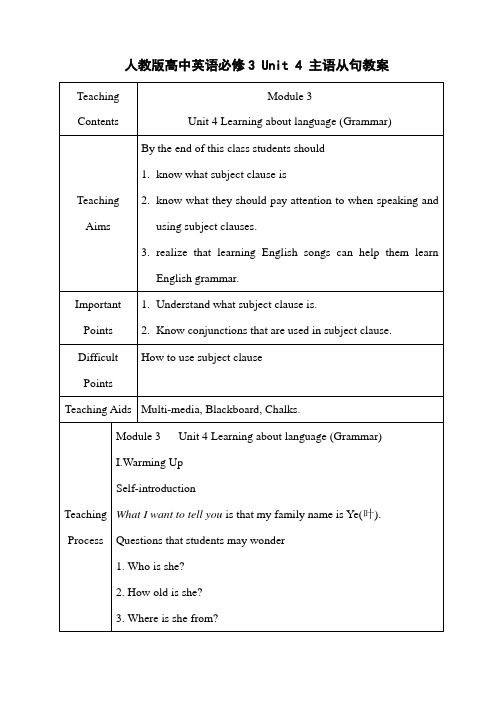高中英语人教版必修3教案:Unit 4 Period 3 Learning about language Grammar
人教版高中必修3英语Unit4教学计划范文

Step 3 listening
Listentothepassagecarefully,thendecideifthefollowingstatementsaretrue
(T) or false (F).
人教版高中必修3英语Unit4教学计划范文
想要学好英语就必须对每课在课前进行计划的制订,英语Unit4教学计
划的内容及要点如下,不知道对大家制定本单元的计划有启发作用吗?
Teaching aims教学目标
Knowledge and ability aims知识与技能目标
1.Get students to grasp some important new words and expressions.
Step 4 Summary
Step5 Homework
1. Search for more knowledge about the common sense of astronomy.
2. Recite the new words and preview thelanguage points.
人教版高中必修3英语Unit4教学计划范文的内容就是这些,不知道大家
sense of astronomy.
2.Get Ss to use different reading skills for different reading purposes.
Teaching Methods教学方法
1. Task-based teaching and learning; 2. Cooperative learning
What do you know?
人教版高中英语必修三教案:unit4+Grammar+practice.doc

单元(章节)精美句子1、善思则能“从无字句处读书”。
读沙漠,读出了它坦荡豪放的胸怀;读太阳,读出了它普照万物的无私;读春雨,读出了它润物无声的柔情。
读大海,读出了它气势磅礴的豪情。
读石灰,读出了它粉身碎骨不变色的清白。
2、幸福幸福是“临行密密缝,意恐迟迟归”的牵挂;幸福是“春种一粒粟,秋收千颗子”的收获. 幸福是“采菊东篱下,悠然见南山”的闲适;幸福是“奇闻共欣赏,疑义相与析”的愉悦。
幸福是“随风潜入夜,润物细无声”的奉献;幸福是“夜来风雨声,花落知多少”的恬淡。
幸福是“零落成泥碾作尘,只有香如故”的圣洁。
幸福是“壮志饥餐胡虏肉,笑谈渴饮匈奴血”的豪壮。
幸福是“先天下之忧而忧,后天下之乐而乐”的胸怀。
幸福是“人生自古谁无死,留取丹心照汗青”的气节。
3、大自然的语言丰富多彩:从秋叶的飘零中,我们读出了季节的变换;从归雁的行列中,我读出了集体的力量;从冰雪的消融中,我们读出了春天的脚步;从穿石的滴水中,我们读出了坚持的可贵;从蜂蜜的浓香中,我们读出了勤劳的甜美。
4、成功与失败种子,如果害怕埋没,那它永远不能发芽。
鲜花,如果害怕凋谢,那它永远不能开放。
矿石,如果害怕焚烧(熔炉),那它永远不能成钢(炼成金子)。
蜡烛,如果害怕熄灭(燃烧),那它永远不能发光。
航船,如果害怕风浪,那它永远不能到达彼岸。
5、墙角的花,当你孤芳自赏时,天地便小了。
井底的蛙,当你自我欢唱时,视野便窄了。
笼中的鸟,当你安于供养时,自由便没了。
山中的石!当你背靠群峰时,意志就坚了。
水中的萍!当你随波逐流后,根基就没了。
空中的鸟!当你展翅蓝天中,宇宙就大了。
空中的雁!当你离开队伍时,危险就大了。
地下的煤!你燃烧自己后,贡献就大了6、朋友是什么?朋友是快乐日子里的一把吉它,尽情地为你弹奏生活的愉悦;朋友是忧伤日子里的一股春风,轻轻地为你拂去心中的愁云。
朋友是成功道路上的一位良师,热情的将你引向阳光的地带;朋友是失败苦闷中的一盏明灯,默默地为你驱赶心灵的阴霾。
英语 人教必修版 第三册教案 Unit4

二、教学方法建议(一)主题任务(Core task)根据本单元的中心话题,建议设计以下三个任务供教师参考,并根据实际情况运用任务。
任务一:收集植物活动时间:完成热身、听力及口语之后语言知识要求:与本单元有关的词汇语言技能要求:听、说活动形式:1.个人活动:搜索有关植物的知识,记录整理:2.小组活动:四至五人一组,小组同学互相介绍自己搜集的植物,然后推选一至两人到班上展示。
3.班级活动:各组学生代表用表格、图片或课件等形式向同学介绍该植物。
其他同学做记录,尽可能多地了解植物。
任务目的:1.熟悉、认识更多的植物;2.更多地了解植物的特性、象征意义等;3.在实践中运用所学语言及知识,解决生活中的问题。
任务二:小小花卉展(小小生物角)活动时间:贯穿整个单元语言知识要求:与本单元相关的词汇语言技能要求:听、说,读、写活动形式:1.班级活动:本单元一开始,教师布置每个同学(或两人一组)准备一种或一种以上花盆植物,可以是家里现成的,也可以是自己去山上采挖、然后种植于花盆的。
2.个人或两人小组活动:同学分头准备花盆植物,并用英语记录花卉名称、产地、用途、花卉形状、象征涵义等。
3.个人或两人小组活动:记录、观察花卉的生长过程,做观察日记:如土壤要求、气候要求、用水要求、成长变化等。
4.分组活动:6-8人一组,同学之间互相介绍自己所准备的植物,用英语描述、介绍该植物的特性等;然后贴上标签,注明植物名称、标明植物特性,挂上自己做的观察日记。
小组同学互相提出修改意见。
5.班级活动:植物展览,同学互相学习,评出最佳花卉、最佳植物描述、最佳观察日记等。
任务目的:1.培养、激发学生对大自然的热爱;2.尽可能多熟悉、解植物特别是花卉的有关知识;3.培养学生仔细观察、认真记录的习惯,并注意准确记录;4.将所学语言和知识用于实践,学以致用;5.美化、爱护环境。
任务三:生物科学家论坛活动时间:学完“读前”、“阅读”、“读后”、“综合技能”之后语言知识要求:本单元有关词汇语言技能要求:读、写、说、听活动形式:1小组活动:以4-6人为一小组,讨论确定将要介绍的生物科学家。
人教新课标高中英语必修三Unit4_Astronomy全单元详细教案[1]1
![人教新课标高中英语必修三Unit4_Astronomy全单元详细教案[1]1](https://img.taocdn.com/s3/m/cca11907de80d4d8d15a4ff3.png)
Unit 4 Astronomy: thescience of the starsContents 目录一、单元教学目标和要求(Teaching aims and demands)二、教材内容分析(Analysis of the teaching materials)三、单元预习任务(Pre-unit task)四、教学安排(Teaching arrangements)五、教学步骤(Teaching procedures)六、背景参考资料(Background knowledge)七、评价与反思(Assessment and reflection)一、教学目标和要求(Teaching aims and demands)根据《英语新课程标准》(实验稿)关于总目标的具体描述,结合高一学生实际和教材内容,我们将教学目标分为语言知识、语言技能、学习策略、情感态度、文化意识五个方面。
1.语言知识(Knowledge)词汇(Vocabulary):能理解、内化、运用以下生词--atmosphere, violent--violence, solid, explode, oxygen, surface, planet, harmful—harm, development—develop, spread, method, presence, telescope, disappointed, force, gradually, float, mass,短语(Phrases and expressions):the solar system, in time, carbon dioxide, prevent… from, depend on, cheer up, now that, break out,功能(Functions):学习掌握一些用于陈述问题及给予意见的结构,如:My problem/ trouble is……? The difficulty / question is…My advice/ suggestion is…What I think about it is…Please pay attention to…Make sure you …Watch out for…语法(Grammar):掌握和运用主语从句。
必修三Unit 4(4) 教案 人教版高中英语

2018 年月日第周星期①Do you know about some background knowledge of these three great scientists ?②Can you say something about them?(2) Ask Ss to look through Ex1 and Ex2 on P30 and get fully prepared for listening to the tape.2. Listening(1) Ask Ss to listen to the tape and finish Ex1 on P30.(2) Play the tape again and ask Ss to check the answers in pairs.(3) Ask Ss to listen to the tape for the third time and finish Ex2 on P30. Then have some of them explain their answers.Step 2. ReadingPurpose : To get Ss to know about human being’s feelings of visiting the moon. 1. Fast readingAsk Ss to look through the text quickly and choose the best answer to the following question.The passage is mainly about ____?A. introduction of the moonB. the gravity that I felt on my way to the moonC. my visit to the moonD. my friend Yanping, an astronomer Suggested Answer: C.2. Intensive readingAsk Ss to read the text carefully and finish the following exercises.(1) According to the text, we know that the force of the gravity would change_____ times.A. 2B. 3C. 4D. 5(2) When did the author feel strongest of the gravity of the earth?A. On the moon.B. On the half way to the moon.C. At the very beginningD. On their leaving from the moon(3) What causes the writer to feel that he becomes weightless on the moon?A. SpaceshipB. GravityC. His friendD. His Good feelings of the moon(4) From the text we can know if a man grows up on the moon, _____.A. he will grow taller than on the earthB. he will grow shorter than on the earthC. he will become fatterD. he will become weightless Suggested Answers: (1) B (2) C (3) B (4) AStep 3. Speaking and writingPurpose: To get Ss to learn how to prepare a list of things used for going to the moon.To practice the writing ability of Ss.1. Divide the whole class into 6 groups. Let Ss discuss with their group members what they might need to go to the moon. Meanwhile, ask one student of each group to write down the important parts of their discussion.2. After the discussion Ss have had some knowledge of the things they would need if they were going to the moon. Get them to describe the three ways in which gravity changed for Li Yanping and how his weight changed..3. Then Ss to write a short passage explaining three problems they might meet on the moon as well as the solutions to these difficulties. Before writing, they can have a discussion.Step 4. Consolidation1. Ask Ss to finish Ex2 and Ex3 on P63~P64 and let them check the answers together.2. Ask Ss to finish the following exercises.(1) Fill in the blanks with proper words according to the given information.①The scientific study of the stars is called a______________.②Eating too much during the Spring Festival can do great h_______ to our health.③The patient’s health is g___________ improving with the help of the doctor.④The mixture of gases that surround the earth is called a_____________.⑤People can find lots of v___________ scenes in some American films.⑥Hearing the exciting story, almost everyone in the room _____________(爆发) with laughter.⑦The forest __________(延伸) as far as the river bank.⑧The wife was much ____________ (失望的) at her husband’s absence.⑨Marx was _________ (强迫) to leave his motherland for political reasons.⑩There is much dust __________ (漂浮) in the air.Suggested Answers: ①astronomy ②harm ③gradually ④atmosphere⑤violent ⑥exploded ⑦spreads ⑧disappointed ⑨forced ⑩floating(2) Finish the following sentences according to the Chinese.①______________________________________ (使我苦恼的) is that I haven't heard from him recently.②Do not read books in the poor light as it is _____________________ (对你的眼睛有害).③_____________________ (随着时间的推移), we are getting better with each other.④_____________________________________________ (我过去在工厂工作了十年) has a great and active effect on my life.⑤Please try to come back early _______________________________. (既然一切都安排好了)Suggested Answers:①What makes me upset / annoyed ②harmful to your eyes ③As time goes by ④That once I worked in a factory for ten years ⑤now that everything has been arranged(3) Choose the best answer to the following sentences.①The Americans are eating _____ vegetables today as they did before.A. more than twiceB. more than twice as manyC. twice over as manyD. over twice as much②If you always work so hard like this, you will ____ sooner or later..A. break upB. break out C break down D. break in③—Will you go out for shopping this Sunday?—Well, ___________.A. I would like to go.B. it all dependsC. I have a lot of work to doD. certainly not④Beyond _____ stars the astronaut saw nothing but _____ space.A. the; /B. /; theC. /; /D. the; the⑤_____ you have got a chance, you might as well make use of it.A. AfterB. AlthoughC. As soon asD. Now thatSuggested Answers: ①B ②C ③B ④A ⑤DStep 5. Homework1. Ask Ss to use the words and phrases learned in this unit to write a short passage about their own opinions on traveling to space.2. Ask Ss to preview the next period.课后反思:。
人教版高中英语必修3 UNIT4 主语从句教案

b. Whether has he passed the exam is still unknown.( F )
Step 3 Ask students to tell conjunctions that are used in subject clause.
6.How Xu Jinglei writes so many attractive storiesis a puzzle.
Ask students to tell the role of the italic words of each sentence.
Rule1:A sentence which is used as a subject is called subject clause.
Rule2:Subject clause should be in statement.主语从句要用陈述句语序
1. a. Where will the meeting be held is not decided. ( F )
b. Where the meeting will be held is not decided. ( T )
2.know what they should pay attention to when speaking and using subject clauses.
3.realize that learning English songs can help them learn English grammar.
2.是否还有幸存者,我们不知道。
Whether there are survivors is still a question.
高一英语必修3 Unit 4教案
高一英语必修3 Unit 4教案Unit 4 Astrn:the siene f the starsI 教学内容分析本单元的中心话题是“天学”。
本单元的两篇都采用了叙述性体。
第一篇阅读短按照时间顺序主要叙述了地球上生命的起和发展过程。
第二篇阅读短中作者用第一人称的口吻讲述了他和朋友的登月经历。
可以说本单元科学知识含量较高,更能激发学生的学习兴趣和好奇心。
aring Up 部分共有两个问题,第一个问题让学生说出八大行星并看图指出各个行星的名称;第二个问题让学生说出自己对天学哪些方面感兴趣以及天学家所关注的方面。
在高考的重压之下,同学们都想能利用科学的学习方法做到事半功倍而且很多学生也一直做着将能成为科学家的梦。
所以,该话题会让学生们兴趣盎然,积极思考和讨论此方面的内容,从而达到热身的目的。
Pre-reading 部分也提出了三个问题,主要是让学生区分宗教信仰、化传统和科学思想之间的不同。
可以以讲故事的方式让学生彼此之间分享一些有关宇宙和地球起方面的传说或故事,这样既能激活他们的思维也能为阅读部分打下基础。
Reading 部分描写了地球上生命的起和发展过程,具体写了由于水的形成才使得地球上生命的诞生成为可能。
科学家认为,地球上的生命最初诞生于水中。
数万年后,陆地上才长出了绿色植物,随后出现了陆栖动物和水陆两栖动物。
最初的动物靠孵化繁衍后代,再之后诞生了哺乳动物,人类也随之诞生了。
最后讲述的现象发人深省:The earth a bee t ht fr the lives n it它关系到地球上生命的未。
prehending 部分通过五个练习题检测学生对本核心内容的理解。
练习1是对结构的分析以及大意的概括;练习2通过排序的方式帮助学生弄清本的行线索,也就是地球上生命的起和发展历程;练习3提出个小问题,考查学生的深层理解和推断能力;练习4让学生找出中出现的连接词,检查学生对中句型的熟悉和理解程度,同时还有助于学生在写作方面得到提高;练习让学生选择一个问题进行回答并向全班汇报,开拓学生的思维并锻炼他们的语言表达能力。
人教版英语必修三Unit 4(第一课时)教案
Unit 4 How Life Began on the Earth人教版高一英语必修三第四单元第一课时一教学课型阅读课二教材分析这节课内容的中心话题是“天文学”。
这篇文章是一篇夹叙夹议的说明文。
讲述了地球上生命的起源,先从“宇宙大爆炸”讲起,具体介绍了各种生物的起源和出现的顺序。
文章脉络清晰,结构分明,“生命起源”这一话题对高中学生来说充满了趣味性,引人入胜,给学生留下很大的思考空间,能够激发学生的想象力,积极去阅读文章,了解生命的起源以及生物进化的过程。
接着文章就人类对地球的负面影响和地球是否能延续进行讨论。
学生通过略读、速读、摘记等,根据各环节设计的具体任务来学习理解这篇文章,帮助学生进一步了解保护地球的重要性。
通过任务型教学,促进学生进行小组合作学习。
三学情分析高一年级的同学经过上一学期的学习,对于高中学习方式以及培养的能力都有了一定的认识。
在阅读技巧方面,大都学生已经掌握了如略读、跳读、细读等阅读技巧,能在短时间内找到关键词和关键句;但是由于基础不一样,并且地球起源这个话题对于大部分学生来说是陌生的,特别是对于初中基础差暂时落后的学生,所以这也要求我们在设计学案的时候要难度设计要层层递进,区别对待基础不同的学生。
四教学目标 1 知识目标:通过阅读学习,使学生能读懂文章内容,理清文章脉络,让学生了解地球生命的由来以及生命进化的过程 2 能力目标:通过略读、速读、摘记等培养学生的文本解读能力帮助学生形成有效学习策略,提高自主阅读的能力;在质疑,小组探究,同伴互助学习过程中,培养学生独立思考,推理,判断和创造性思维的能力和合作学习策略。
3 情感目标:通过对文章的学习及课堂活动参与激发学习热情,产生学习英语的浓厚兴趣;了解地球上生命的起源及其发展过程,并学会用科学的眼光看待事物,激发学生探索科学的热情。
引起他们对地球未来的关注,对地球面临危机的思考,意识到爱护地球,关爱生命的重要性。
五教学重点难点1. 让学生了解地球生命进化的历程,培养学生获取,分析和处理信息的能力。
2019-2020学年高中英语人教版必修三unit4全单元导学案
2019-2020学年高中英语人教版必修三Guided Learning Plan Unit 4 Astronomy: the science of the starsPeriods 1 &2 Warming-up, Pre-reading and Reading学习重点:1.理解课文,掌握课文中的基础知识。
2.了解太空的背景知识,培养学生的科学探索精神。
学习难点:把握文章的写作顺序,培养快速阅读与整体理解能力。
学法指导:1.快速阅读,掌握课文大意 2. 细读,掌握课文情节和细节,用红笔画出难点 3.通过合作探究主动质疑,学会总结文章段落大意,深入理解课文内容。
A.自主探究Task 1 fast readingSkimming: Go through the passage quickly to get the main idea of each paragraphPara. 1 The formation(形成) of the earth.Para. 2 The importance of water for life.Para. 3 A widely accepted theory about the formation of the universe.Para. 4 The arrival of humans and their impact on the earth.Para. 5 The development of plants and animals on the earth.Task2:True (T) or False (F).1. The earth appeared before the Big Bang happened.( )2. The original atmosphere consisted of nitrogen and oxygen. ( )3. The main difference between the earth and other planets is that there is water on the earth. ( )4. Life began in water and then on land.( )5. Mammals appeared before the development of dinosaurs.( )6. Dinosaurs could give birth to young baby animals and produced milk to feed them.( )7. Human beings produce too much carbon dioxide which causes the global warming on the earth.( )8. According to the text, human beings would disappear in the end. ( )B.合作探究Careful reading:Task1.Scan for the detailed information and find the part talking about the development of life:a cloud of ______→ a solid ______→presence of ______→ small _____ in water → _______ and all sorts of fish → Green ____ on land → ______ and ______ appear → Plants grew into _______ → _____ (on land) →__________( on land) → __________ (on land) →____________ (small clever animals on land)Task2.Read the passage again and try to finish the answers below.1).Why was the earth different from other planets?2).Why did the plants grow before the animals came?3).Why is it wrong in films and stories to show dinosaurs and people together?4).Why do you think that humans are the cleverest animals on the earth?5).There used to be nine planets in the solar system. Recently scientists have decided that one of them can no longer be considered a planet. Do you know the name of that planet? Do you know why they removed it?6).What problem is caused by human beings?C.反馈测试根据课文完成短文并复述课文The _________of the earth produced water vapour, which turned into water when the earth ________down. Water allowed the earth to ________harmful gases into the oceans and seas. That made it possible for life to begin to develop. The arrival of small________ encouraged the development of early shellfish and all ________of fish. Many millions of years later the first________ plants began to appear on land. Later land animals appeared. Some were insects. At last________ rule the world, but they are not taking _________of the earth very well.D.延伸拓展根据所给首字母或中文意思填写单词。
人教版必修三第四单元教案
Unit 4 Astronomy: the science of the starsHow life began on the earth (reading)Teaching Aims:Knowledge aims: 1. To get Ss to know something new words and structures about the astronomy.2. To grasp the idea of the passage ….Ability aims: 1.To dev elop Ss’ basic skills of speaking and reading. Reading is the focus in this lesson. Reading skills for Ss include (predicting, skimming, scanning and digesting.)2.To retell the story according to the time orderEmotional aims: To develop the students’ responsibility to protect the earth.Lesson type:period 1Lesson time: 45 minutesTeaching important points:1. Let ss. learn some related words ,expressions and structures in this part;2. Improve ss. reading skills (predicting, skimming, scanning, guessing difficult words, topic sentences)3. Help ss. understand the development of the creatures according to the time order Teaching difficult points:To retell the development of the creatures according to the time orderTeaching methods: Task-based teaching and Cooperative learningTeaching Aids: a multi-media computer and a blackboardTeaching Procedure:Step 1. Warming-up & lead-inTask 1 (class work)To show some pictures about eight planets on PPT and get the students to match the pictures with their English names.Task 2 (individually)Brain-storm some topics that are about astronomy. If the students can’t think of much, I will list some of them.Task 3 (group work)To offer some questions about astronomy and get the students to choose what they are the mostinterested in to answer. Then tell the ideas to the group members. The following questions are included.1.How did the universe begin?2.How did the life on the earth begin?3.What is the “black whole”?4.Is there life on other planets besides the earth?5.What happened to all the matter after the “Big Bang”?Step 2. Pre-readingTask 1 to tell the story (class work)To show the pictures about that Nvwa ,God and Darwin, and to get the students to answerQ: Can you tell something about the pictures?Task2 predicting (individually)Read the title of the passage and predict what the passage is about.Step 3. While-readingTask 1(individually) Teaching the new words and structuresStudents are encouraged to preview the text and find out the new words and structures. They should try to work out the meaning of the new words through context. If necessary, they can look up in the dictionary or turn to the teacher for help.Task2 skimming (individually)Ss are required to go through the whole passage quickly to get the general idea and pay special attention to the first or last Para of the article (or the first sentence or the last sentence of each Para.)Task 3 scanning (group work)1.When did the “big bang” happen?2.What form was the earth after the “big bang” ?3.How did water come into being on the earth?4.what made up the earth’s atmosphere after the earth exploded?5.what’s the significance of the presence of water on the earth?6.what was important to the development of fish?7.what made possible the rise of mammals on the earth?8.why are mammals different from all life forms in the past?Task 4 careful reading (group work)Encourage Ss to read the passage again. According to the time order, students are encouraged to exchange their understanding of the passage with their group members and work together to fill in the following form:Step 4. Post-readingTask1 retell (pair work)look at the picture on the page of 26 of the text book and retell the procedure of the development of the creatures.Task2 Discussion (Group work)Reread the sentence “The earth may become too hot to live on” a nd discussWhat can we do to protect the earth?Step 5. HomeworkTask1 consolidate the new words and structures they have learned.Task 2 Encourage Ss to go to the school library or get on the Internet if possible to consult related English websites to search for more information about the origin of life on the earth and find out more evidence to support the theory on the internet.Blackboard-design for this period:TitleHere are some new words for SsHere is the form 1 23 5 46 789。
- 1、下载文档前请自行甄别文档内容的完整性,平台不提供额外的编辑、内容补充、找答案等附加服务。
- 2、"仅部分预览"的文档,不可在线预览部分如存在完整性等问题,可反馈申请退款(可完整预览的文档不适用该条件!)。
- 3、如文档侵犯您的权益,请联系客服反馈,我们会尽快为您处理(人工客服工作时间:9:00-18:30)。
Unit 4 Astronomy: the science of the starsPeriod 3Learning about language: Grammar整体设计教材分析This is the third teaching period of this unit. To test whether students have grasped the important and difficult language points they learned in the last period, the teacher should first offer them some revision exercises. Then lead in the new lesson.This teaching period mainly deals with the following: 1. Reviewing noun clauses as the object and as the predicative; 2. Learning the new grammar items: noun clauses as the subject. Students often feel noun clauses abstract and difficult to learn, so it is necessary to make the lesson interesting and lively, and connect it with their daily life in order to let it easy to accept and understand. Firstly, the teacher can ask students to read the passage HOW LIFE BEGAN ON THE EARTH again, tick out all the sentences from the passage where noun clauses are used as the subject, and then translate them into Chinese. Secondly, compare and discover the uses of each noun clause by giving a lot of example sentences. Thirdly, do the exercises in Discovering useful structures on Page 29 and more exercises for students to master the related noun clauses. Finally, summarize the use of noun clauses as the subject and let students make it clear how each noun clause is being used in the situations.At the end of the class, ask students to do the exercises in Using structures on Page 64 and more additional exercises for consolidation.教学重点Get students to understand and use noun clauses as the subject.教学难点Enable students to learn how to use noun clauses as the subject correctly.三维目标知识目标1. Get students to know more about noun clauses.2. Let students learn noun clauses as the subject.What it was to become was a mystery. . .. . . it was not clear whether the solid shape was to last or not.能力目标Enable students to use noun clauses as the subject correctly and properly according to the context.情感目标1. Get students to become interested in grammar learning.2. Develop students’ sense of group cooperation.教学过程设计方案(一)→Step 1 Revision1. Check the homework exercises.2. Dictate some new words and expressions.3. Translate the following sentences.1) 你早晚会来的。
2) 我的车与你的不一样。
3) 他总是第一个来, 最后一个走。
4) 他来不来还不清楚。
5) 我们的成败取决于是否每个人都努力工作。
6) 我们必须采取措施防止这种疾病的蔓延。
Suggested answers:1) You will come here in time.2) My car is different from yours.3) He is always the first to come and the last to go.4) It is not clear whether he comes or not.5) Our success depends on whether everyone works hard or not.6) We must take actions to prevent this disease (from) spreading.→Step 2 PreparationShow some sentences on the screen. Ask students to read each of them and then find out its subject.A tree has fallen across the road.You are a student.To find your way can be a problem.Smoking is bad for you.“How do you do? ” is a greeting.What she said is not yet known.That we shall be late is certain.It’s certain that we shall be late.→Step 3 Grammar learning1. Reading and discoveringAsk students to turn back to Page 25 to read through the reading passage and find all the sentences where noun clauses are used as the subject and underline them. Then translate them into Chinese.Suggested answers:1) What it was to become was uncertain until between 4. 5 and 3. 8 billion years ago when the dust settled into a solid globe.地球会变成什么(样子), 直到45亿至38亿年前这个云团变成一个固体的球状物, 才确定下来。
2) The earth became so violent that it was not clear whether the shape would last or not.地球变得激烈动荡, 不知道这个固体形状是否会继续存在下去。
3) What is even more important is that as the earth cooled down, water began to appear on its surface.更重要的是, 随着地球的冷却, 地球的表面就开始出现了水。
4) It was not immediately obvious that water was to be fundamental to the development of life.水对于生命的发展会起关键作用, 这一点在当时并不明显。
5) What many scientists believe is that the continued presence of water allowed the earth todissolve harmful gases and acids into the oceans and seas.很多科学家相信, 由于地球上长期有水存在, 使地球得以把有害气体和酸性物质溶解在海洋里。
6) Why they suddenly disappeared still remains a mystery.为什么他们突然消失了, 至今还是个谜。
7) So whether life will continue on the earth for millions of years to come will depend on whether this problem can be solved.所以, 在未来的数百万年中, 生命能否在地球上延续取决于这个问题能否得到解决。
2. Thinking and discussingLet students read aloud the sentences they picked out, think over and discuss with a partner how each of these noun clauses is being used in the situations. If students have some difficulty, give them a hand.3. Summing up: noun clauses as the subject.主语从句作主语用的名词性从句, 因其在复合句中作主语, 又称主语从句。
